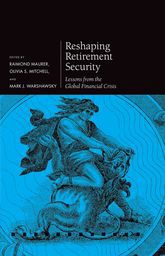Raimond Maurer, Olivia S. Mitchell, and Mark Warshawsky, Editors
The worldwide financial crisis has wrought deep changes in capital and labor markets, old-age retirement systems, and household retirement and consumption patterns. Confidence has been shaken in both the traditional defined benefit and defined contribution plans.
Around the world, plan sponsors, fiduciaries, policymakers, and households have gained a new awareness of retirement risk. When pressed to reform post-crisis, many would recommend enhancing financial advice for plan participants, emphasizing flexibility and the positive effect of working another one or two years to make up for investment losses in the downturn. Adding to this is the continuing need for financial education, essential as the retirement system moves increasingly toward personal account pensions. Perhaps most important of all is the need for greater understanding of risk throughout the retirement security system, along with new approaches to re-engineering retirement pensions.
This volume explores the lessons to be learnt for retirement planning and long-term financial security in view of the massive shocks to stock markets, labour markets, and pension plans resulting from the financial crisis. It aims to rethink retirement in the new economic era, including the resilience of defined contribution plans and how defined benefit plans reacted to the financial crisis.
Publication date: November 2012 · Oxford University Press · ISBN 0-19-966069-8
- Order online from Oxford University Press
- Table of Contents
- Chapter 1: Retirement Security and the Financial and Economic Crisis: An Overview
Raimond Maurer, Olivia S. Mitchell, and Mark J. Warshawsky - Chapter 2: Changing Retirement Behavior in the Wake of the Financial Crisis
Julia Coronado and Karen Dynan - Chapter 3: Potential Impacts of the Great Recession on Future Retirement
Incomes
Barbara A. Butrica, Richard W. Johnson, and Karen E. Smith - Chapter 4: Effects of the Economic Crisis on the Older Population:
How Expectations, Consumption, Bequests, and Retirement Responded to Market Shocks
Michael Hurd and Susann Rohwedder - Chapter 5: Retirement Behavior and the Global Financial Crisis
Jason J. Fichtner, John W. R. Phillips, and Barbara A. Smith - Chapter 6: Trading in 401(k) Plans during the Financial Crisis
Ning Tang, Olivia S. Mitchell, and Stephen P. Utkus - Chapter 7: Life Cycle Impacts of the Financial Crisis on Optimal Consumption: Portfolio Choices and Labor Supply
Jingjing Chai, Raimond Maurer, Olivia S. Mitchell, and Ralph Rogalla - Chapter 8: A Stress Test for the Private Employer Defined Contribution System
David Wray - Chapter 9: Defined Benefit Pension Plans and the Financial Crisis:
Impact and Sponsors and Government Reactions
Mark J. Warshawsky - Chapter 10: Multiemployer Pension Plans Respond to the Financial Crisis
Judith F. Mazo and Eli Greenblum - Chapter 11: Adopting Hybrid Pension Plans: Effects of Economic Crisis and Regulatory Reform
Robert L. Clark, Alan Glickstein, and Tomeka Hill - Chapter 12: Collective Pensions and the Global Financial Crisis:
The Case of the Netherlands
Lans Bovenberg and Theo Nijman - Chapter 13: How Have Public Sector Pensions Responded to the Financial Crisis?
Andrew G. Biggs - End Pages and Index
- More PRC Books



